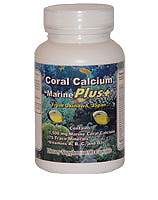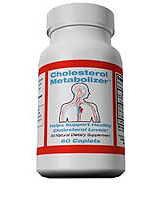Menu
- About Vitamin K
- Vitamin K1
- Vitamin K2
- MK-4 versus MK-7
- Trans and Cis form Isomers
- Vitamin K-dependent Proteins
- Movement of Vitamin K in the body
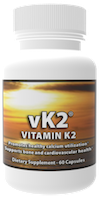
Vitamin K Research

- Dam observed the anti-haemorrhagic effect of Vitamin K on chickens.
-
In 1940 Dam received half of the Nobel Prize for his discovery of vitamin K
and its blood coagulation factors. - Edward Albert Doisy, of St. Louis University, received the other half of the Nobel Prize for his discovery of the chemical nature of vitamin K.
- Identification of Gla, gamma-carboxyglutamate
- Identification of other vitamin K-dependent proteins .
- Improved assay methods
- Discovery of more VKDP's
- Correlation of Vitamin K status to Bone and Cardiovascular health
- Vitamin K research has been inconsistent and inconclusive:
- Much of the research has looked at Vitamin K1 and K2 together
- very little differentiation between Vitamin K1 and K2.
- very little differentiation between MK-4 and MK-7.
- Much more research is required to gain a better understanding of Vitamin K:
- other Vitamin K-dependent proteins?
- other Vitamin K-dependent functions?
- The research to date suggests that:
- Vitamin K1 is not important for most people to supplement.
- Vitamin K2 supplementation is very important for:
- Healthy Bones
- Healthy cardiovascular system
- Brain health
- Kidney health
- Bladder health
- Prostate health
- Healthy production of testosterone
- Skin health
- Pregnant mothers, fetuses and new borns
- There has not been much research comparing MK-4 to MK-7
- each have similar functions
- each have unique capabilities
- It seems reasonable to deduce we need both MK-4 and MK-7.
Vitamin K Status
- based on analysis of self-reported dietary intake questionnaires
- very inaccurate and inherently limited
- based on assay of various circulating vitamin K status markers.
- more objective and accurate
- reflects both intake and metabolism
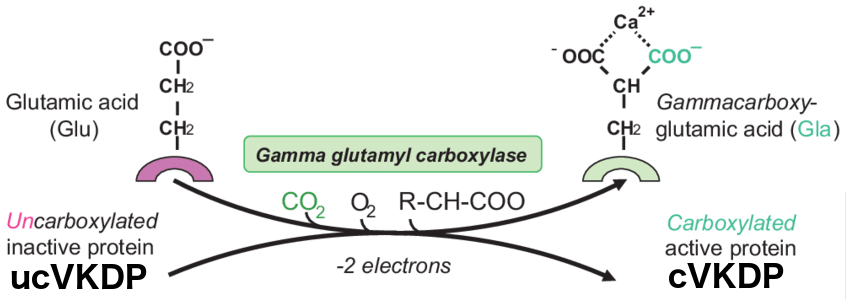
- Vitamin K2 status biomarkers.
- uncarboxylated (unactivated) VKDP's (ucVKDP) in the blood.
- Nearly all studies today quantify vitamin K status with this method.
- higher uncarboxylated concentrations reflect lower vitamin K status.
- ucOC (undercarboxylated form of osteocalcin)
- a nutritional biomarker reflective of vitamin K status
- an indicator of bone health
- an active hormone that mediates glucose metabolism in experimental studies.
- dp-ucMGP (dephosphorylated uncarboxylated MGP)
- Assays that measure total circulating MGP (regardless of its carboxylation status) have been available for some time.
- Recently, assays that measure different fractions of MGP in circulation have been developed, of which dephosphorylated uncarboxylated MGP (dp-ucMGP) best reflects vitamin K status.
- Nowadays, dp-ucMGP is available as a fully automated commercial assay, which makes it a feasible marker as routine laboratory assessment in clinical practice.
- serum Vitamin K2 level in the blood
- Has very little usefulness:
- MK-4 is the only vitamin K2 form that can be detected for those on a western diet.
- it takes a lot more MK-4 supplementation than MK-7 to be detected in the blood
- MK-4 has a much shorter half life in the blood
Vitamin K Dosage
Theoretically, the ideal dosage of Vitamin K2 could be defined as the amount of MK-4 and/or MK-7 needed to
- activate all our Vitamin K2-dependent proteins.
- not excede the maximum safety amount
MK-4 and MK-7 have different properties, which must be considered in determining the ideal dosage.
- Effective dose
- Some researchers have suggested that 180 to 280 micrograms of MK-7 is enough.
-
Other researchers have suggested that MK-4 may require a much higer dose
- MK-4 may be less bioavailable than MK-7.
- The body contains much more MK-4 than MK-7.
-
2012
Comparison of menaquinone-4 and menaquinone-7 bioavailability in healthy women
Sato T, Schurgers LJ, Uenishi K. Nutri Journal. 2012;11:93.- This study compared the bioavailability of MK-4 and MK-7 in healthy volunteers in their serum (blood) levels.
- They were given 420 ug of MK-4 or MK-7 every morning along with breakfast.
- MK-7 reached maximal serum level at 6 hours after intake and was detectable up to 48 hours after intake.
- MK-4 was not detectable in the serum at any time point, even after 7 consecutive days of administration.
- The researchers concluded that:
-
the current recommended dosage of MK-4 is too low,
- a higher dose is required to improve the carboxylation of osteocalcin.
- There does not appear to be toxicity issues for either MK-4 or MK-7.
- MK-4
- 2014 Some Japanese studies have used 45 mg daily dosage without major side effects.
- MK-7
- 2017
US Pharmacopeial Convention safety evaluation of menaquinone-7
Marles RJ, Roe AL, Oketch-Rabah HA., Nutr Rev. 2017 Jul 1;75(7):553-578. - Bioactivity
- MK-4 and MK-7 exists in two isomer forms
- TRANS form is bioactive
- CIS form is NOT bioactive
- Vitamin K2 demand
- Anyone taking cholesterol-lowering statin drugs, has an increased demand for Vitamin K2
- 2015
Statins stimulate atherosclerosis and heart failure: pharmacological mechanisms
Okuyama H, Langsjoen PH, Hamazaki T et al. Expert Rev Clin Pharmacol. 2015 Mar;8(2):189-99. doi: 10.1586/17512433.2015.1011125 - Anyone taking Vitamin D3, has an increased demand for Vitamin K2
- 2016
Calcimimetic and vitamin D analog use in hemodialyzed patients is associated with increased levels of vitamin K dependent proteins.
Fusaro M, Giannini S, Gallieni M et al. Endocrine. 2016 Feb;51(2):333-41. doi: 10.1007/s12020-015-0673-z. Epub 2015 Jul 1.
We recommend taking one capsule of Ultra K for every 5,000 iu of Vitamin D3.
Vitamin K Contraindications
Vitamin K1 and K2 are contraindicated for those taking blood thinning drugs such as Coumadin or Warfarin.
The effect of anticoagulant drugs are negated by Vitamin K1 and K2.
Actually, its just the opposite. These anticoagulant drugs stop K1 from recycling and keep
BOTH K1 and K2 in a deficient state.
- Supplementing with K1 or K2 renders these drugs ineffective.
- There is evidence that some people on anticoagulant drugs may develop arterial calcium deposits.
- 2012
Vascular calcification: the price to pay for anticoagulation therapy with vitamin K-antagonists
Chatrou ML, Winckers K et al. Blood Rev. 2012 Jul;26(4):155-66. doi: 10.1016/j.blre.2012.03.002.
Vitamin K2 and Bone Health
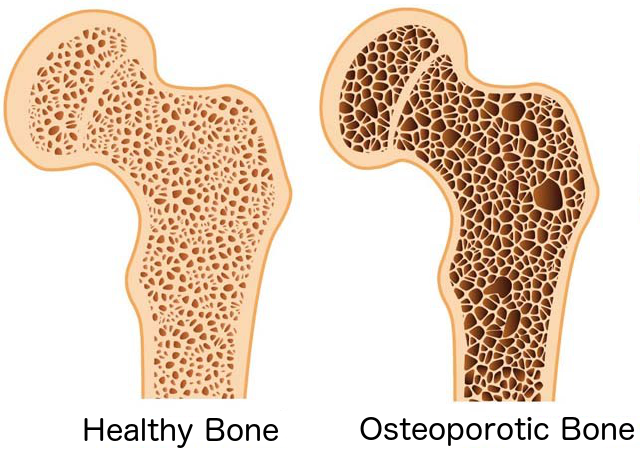
Vitamin K has been correlated to bone health since the 1980's.
Caren M. Gundberg, Jane B. Lian, and Sarah L. Booth, Adv Nutr. 2012 Mar; 3(2): 149-157.
- There has been long-standing interest in the potential role of vitamin K in the prevention of osteoporotic fractures based on its role in carboxylation of osteocalcin. Given the widespread availability of assays for ucOC and its validation as a marker of vitamin K status, this biomarker has been used extensively as a measure of vitamin K's role in bone health, as reviewed elsewhere.
- A plethora of observational studies was published that examined the association of ucOC and various outcomes for bone health, including BMD, qualitative ultrasound of the heel, and hip fracture risk.
- Many of these studies measured ucOC but did not account for total osteocalcin. Although it appeared that the preponderance of evidence suggested a vitamin K-dependent association between osteocalcin and measures of bone, especially in the elderly, the high correlation between ucOC and total osteocalcin may have confounded the findings, because total osteocalcin is a robust marker of bone formation, independent of nutrient effects.
- Therefore, it is difficult to differentiate the osteoblastic effect of osteocalcin from the role of the vitamin K-dependent γ-carboxylated -carboxylation in these studies.
Iwamoto,Takeda and Sato. Keio University School of Medicine, Tokyo, Japan
Curr Pharm Des. 2004;10(21):2557-76.
-
Those with the highest amounts of inactivated osetocalcin have
5x more hip fractures rate than those with activated osetocalcin. -
Although both Vitamin K1 and K2 can activate osetocalcin,
Vitamin K2 is much more efficient than Vitamin K1. - High levels of K2 can support bone health with no side effects.
- "Clinically, vitamin K2 sustains the lumbar bone mineral density (BMD)
-
increases the metacarpal BMD in the paralytic upper extremities of
patients with cerebrovascular disease, - sustains the lumbar BMD in patients with liver-dysfunction-induced osteoporosis."
-
According to the authors:
Knapen MHJ, Hamulyak K, Vermeer C. Ann Intern Med. 1989;111:1001-5.
-
osteocalcin was undercarboxylated by 30% in postmenopausal women
compared to premenopausal women. - When supplemented with Vitamin K1, the postmenopausal women responded with:
- increase in total carboxylated (activated) osteocalcin
- decrease in urinary calcium and hydroxyproline.
-
They did NOT test with Vitamin K2 supplementation
(now known to be be much more effective than Vitamin K1 in activating osteocalcin)
Price PA Connect Tissue Res. 1989;21:51-60.
-
This study identified four vitamin K-dependent proteins (osteocalcin,
matrix Gla protein, protein S, and Gas6) as components of bone matrix.
Soute, BAM, Ulrich, MMW, Knapen, MHJ, van Haarlem LJM, Vermeer C. Calcif Tissue Int 1988;43:184.
- The researches describe an assay procedure for determining the amount of gammacarboxyglutamic acid (Gla) residues in serum- or plasma-osteocalcin.
- It was demonstrated that the Gla-content of circulating osteocalcin from normal cows is similar to that of osteocalcin obtained from bone.
Vitamin K2 and Cardiovascular Health
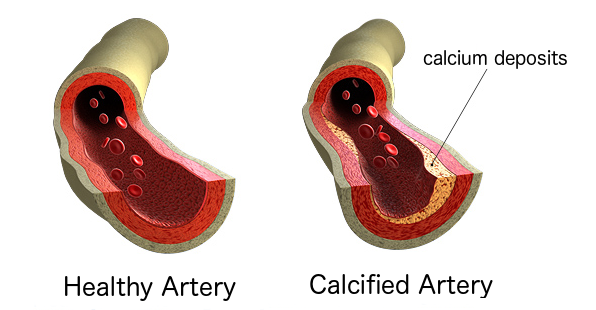
Vitamin K deficiency has been correlated to risk of Coronary Heart Disease (CHD)
-
Dietary Intake of Menaquinone Is Associated with a Coronary Heart Health
The Journal of Nutrition, Volume 134, Issue 11, 1 November 2004, Pages 3100-3105 -
The first study to differentiate the impact of dietary intake of Vitamin K1 and K2
on aortic calcification, heart disease, and all-cause mortality. - 10-year population-based study:
- followed 4,807 initially healthy men and women
- initially 55 years of age (and older)
- Food questionnaire to estimate Vitamin K1 and K2
- The Rotterdam Study conclusions:
- eating foods rich in natural Vitamin K2 (at least 32 mcg/day):
- strongly supports cardiovascular health.
- eating foods rich in natural Vitamin K1,
- had NO protective effect on CHD.
Atherosclerosis JI 2009 Vol 203, issue 2, pp 489-493 Buelens et al
Shea MK, Holden RM. . Adv Nutr. 2012;3(2):158-65.
El Asmar MS, Naoum JJ, Arbid EJ. Oman Med J. 2014 May;29(3):172-7.
Maresz K. Integr Med (Encinitas). 2015;14(1):34-9.
Pivin E, Ponte B, Pruijm M et all. Hypertension. 2015 Jul;66(1):85-92.
van Ballegooijen, Pilz, Tomaschitz, Grubler and Verheyen
Vitamin K2 and the Brain

Guylaine Ferland, Advances in Nutrition, Volume 3, Issue 2, 1 March 2012, Pages 204-212
Guylaine Ferland, Biofactors. 2012 Mar-Apr;38(2):151-7. doi: 10.1002/biof.1004. Epub 2012 Mar 15.
-
Since its discovery in 1993, the Vitamin K-Dependent Protein "Gas6" (Growth arrest-specific 6),
has been closely associated with the nervous system. - Functionally, Gas6 is involved in a wide range of cellular processes that include cell growth, survival, and apoptosis.
- Gas6 acts by signaling cells in both the central and peripheral nervous systems.
- In the brain, Vitamin K2 (MK-4) activates Gas6, which is involved in the synthesis and metabolism of sphingolipids (an important class of lipids present in brain cell membranes).
- Sphingolipids (consisting mainly of: ceramide, sphingomyelin, cerebroside, sulfatide, and ganglioside) are found in high concentrations in both neuronal and glial cell membranes.
- Initially appreciated for their structural role, sphingolipids are now viewed as key players in important cellular events such as proliferation, differentiation, senescence, cell-cell interaction, and transformation.
- In recent years, studies have linked alterations in sphingolipid metabolism to age-related cognitive decline and neurodegenerative diseases such as Alzheimer's disease (AD) and Parkinson's disease.
- Menaquinone-4 (MK-4) is the only form of Vitamin K2 found in the brain and shows unique actions against oxidative stress and inflammation, which could have far-reaching effects in the brain and other components of the nervous system.
Li J, Lin JC, Wang H, Peterson JW, Furie BC, Furie B, Booth SL, Volpe JJ, Rosenberg PA.
- Oxidative stress is believed to be the cause of cell death in multiple disorders of the brain, including perinatal hypoxia/ischemia.
- Glutamate, cystine deprivation, homocysteic acid, and the glutathione synthesis inhibitor buthionine sulfoximine all cause oxidative injury to immature neurons and oligodendrocytes by depleting intracellular glutathione.
- Although vitamin K is not a classical antioxidant, we report here the novel finding that vitamin K1 and K2 (menaquinone-4) potently inhibit glutathione depletion-mediated oxidative cell death in primary cultures of oligodendrocyte precursors and immature fetal cortical neurons with EC50 values of 30 nm and 2 nm, respectively.
- The mechanism by which vitamin K blocks oxidative injury is independent of its only known biological function as a cofactor for gamma-glutamylcarboxylase, an enzyme responsible for posttranslational modification of specific proteins.
- Vitamin K does not prevent the depletion of intracellular glutathione caused by cystine deprivation, but completely blocks free radical accumulation and cell death.
- The protective and potent efficacy of this naturally occurring vitamin, with no established clinical side effects, suggests a potential therapeutic application in preventing oxidative damage to undifferentiated oligodendrocytes in perinatal hypoxic/ischemic brain injury.
Tsaioun, KL. Nutr Rev. 1999 Aug;57(8):231-40.
- It has been previously demonstrated that vitamin K-dependent carboxylase expression is temporally regulated in a tissue-specific manner with high expression in the nervous system during the early embryonic stages and with liver expression after birth and in adult animals.
- This finding, along with the discovery of wide distribution of the novel vitamin K-dependent growth factor, Gas6, in the central nervous system, provides compelling evidence of a biologic role of vitamin K during the development of the nervous system.
- In animals and bacteria, vitamin K was observed to influence the brain sulfatide concentration and the activity and synthesis of an important enzyme involved in brain sphingolipids biosynthesis.
- The role Gas6 plays in the activation of signal transduction events in the brain related changes to the nervous system is also being investigated.
- Investigating the biologic role of vitamin K, and Gas6 in the brain may be important for unveiling the mechanisms of normal and pathologic development and aging of the nervous system.
Sundaram, Fan et al. The Journal of Nutrition, Volume 126, Issue 11, 1 November 1996, Pages 2746-2751
- Administration of the vitamin K antagonist warfarin has previously been shown to decrease brain sulfatide concentrations and decrease brain galactocerebroside sulfotransferase (GST) activity in young mice.
- A dietary deficiency of vitamin K has now been shown to decrease (P < 0.01) brain sulfatide concentrations of 30-d-old mice significantly (by 21%).
- These data suggest that in addition to its recognized role in Gla synthesis, vitamin K status is important in the maintenance of normal complex lipid sulfatide metabolism in young rats and mice.
- The ability of vitamin K to influence the activity of biosynthetic and catabolic enzymes and the turnover of sulfatides suggests a possible regulatory role for vitamin K in the maturing brain.
- Decrease sulfatides have been associated with brain aging and Alzheimer's disease.
Vitamin K2 and the Kidneys

Wei et al. Nephrol Dial Transplant (2017) 1-9.
-
This study was the first population survey assessing the risk of nephrolithiasis
in relation to dp-ucMGP, a biomarker of vitamin K status. - 1,748 randomly recruited Flemish individuals (51.1% women; mean age 46.8 years),
-
dpucMGP and the prevalence of nephrolithiasis was determined at baseline
(April 1996-February 2015) - incidence determined during followup (March 2016).
-
For a doubling of dp-ucMGP, the odds of nephrolithiasis
increased by 31% in the cross-sectional analysis - The Mendelian randomization analysis suggested that this association was causal
-
In the longitudinal analysis spanning 12 years of follow-up (median),
the risk of having recurrent or new nephrolithiasis increased 2.5-fold
for a doubling of the baseline dpucMGP level.
- Dr. Katarzyna Maresz (president of the International Science and Health Foundation.) wrote:
-
2013
Peptides of matrix Gla protein inhibit nucleation and growth of hydroxyapatite and calcium oxalate monohydrate crystals.
Goiko M, Dierolf J, Gleberzon JS, et al. PloS One. 2013;8:e80344.- Synthesized peptides corresponding to sequences of human MGP:
- phosphorylated
- γ-carboxylated
- observed the effects of these peptides on:
- hydroxyapatite formation
- calcium oxalate crystallization
- quantified using:
- dynamic light scattering
- scanning electron microscopy
-
2001
Regulation of osteopontin expression in a rat model of urolithiasis.
Chang L, Feng T, Li J, Dou C, Wei J, Yinghu G. Chinese Medical J. 2001;114(8):829-832. - Investigated the relationship between the expression and regulation of osteopontin and kidney stones.
- Treated rats with vitamin D3, vitamin K, testosterone or estradiol for 7 days.
- The results showed that vitamin K, testosterone and estradiol up-regulated the expression of OPN mRNA and its protein, thus decreasing the precipitation of calcium oxalate in rat kidneys.
"The fact that Western population is vitamin K deficient is well known. A clinical study published by Wei et al (2017) shows that more than one-third of their study participants had a dp-ucMGP level higher than optimal for the prevention of macrovascular complications"
"In a randomized controlled trial, the group given a daily supplementation of VK2 (180 mcg MK-7) demonstrated a 50% reduction of plasma dp-ucMGP levels compared to that of the control group, which was given a placebo [Knapen et al 2015].
Due to fact that it is extremely difficult to keep an optimal vitamin K status with a normal diet, vitamin K2 supplementation should be recommended."
Vitamin K2 and the Bladder

Duan, Yu, Guan, Xu, et al. https://doi.org/10.1371/journal.pone.0161886
- Results demonstrated that:
- Vitamin K2 induced mitochondria-related apoptosis in human bladder cancer cells via ROS-JNK/p38 MAPK signal pathways.
- This potent apoptotic effect was observed on human bladder cancer cells but NOT on normal cells.
Vitamin K2 and Testosterone

Ito A, Shirakawa H, Takumi N, Minegishi Y, Ohashi A, Howlader ZH, Ohsaki Y, Sato T, Goto T, Komai M.
- investigated the function of vitamin K in the testis and analyzed its role in steroidogenesis.
-
Researchers concluded that:
- MK-4 stimulates testosterone production in rats and testis-derived tumor cells via activation of PKA.
- MK-4 may be involved in steroidogenesis in the testis, and its supplementation could reverse the downregulation of testosterone production in elders.
Vitamin K2 and the Placenta & Breast Milk
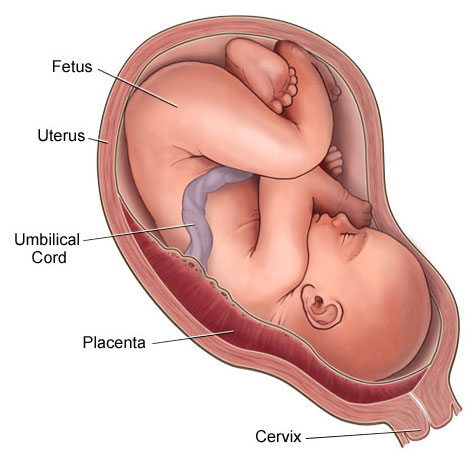
Hiraike H, Kimura M, Itokawa Y. Am J Obstet Gynecol. 1988 Mar;158(3 Pt 1):564-9.
-
MK-4 passes through the placenta and to the fetus,
evidenced by the presence of MK-4 found in the cord blood. -
Mk-7 was NOT found in cord blood,
indicating that MK-7 can not pass through the placenta.
Saga K, Terao T. Nihon Sanka Fujinka Gakkai Zasshi. 1989 Nov;41(11):1713-9.
- Sixty puerperal women were divided into three groups (no MK-7 group)
- the control group
- MK-4 administered group
- Vitamin K1 administered group
- Findings:
- MK-4 is accumulated and concentrated into breast milk, and continuous MK-4 administration can increase the concentration of vitamin K2 in milk.
- MK-7 administration was not studied, so no conclusions can be made about MK-7 and its ability to concentrate into breast milk.
Kojima T, Asoh M, Yamawaki N, Kanno T, et al.. 2004 Apr;93(4):457-63.
- MK-4 is the predominant form of Vitamin K2 found in human breast milk.
Vitamin K2 and Skin

Gheduzzi D, Boraldi F, Annovi G, DeVincenzi CP, Schurgers LJ, Vermeer C, Quaglino D, Ronchetti IP.
- Collagen and elastin are two of the components of skin that give it firmness and elasticity.
- As skin ages, it loses both collagen and elastin, and hence its youthful appearance.
- Skin cells may release matrix-GLA protein to prevent calcification of elastin in the skin.
-
This study looked at a group of patients with pseudoxanthoma elasticum (PXE),
a genetic disorder where premature aging occurs. -
cells from PXE patients were found to have produced
30% less of Gla-MGP compared to controls. -
elastin from PXE patients was calcified due to the
lack of Vitamin K2 activated matrix-GLA protein. -
Vitamin K2 could help maintain youthful skin by activating
Matrix-GLA and in turn preventing calcification of elastin and collagen.
vK2®
Contains:
60 capsules per bottle
(30 day supply)
- MK-4 (5 mg/capsule)
- MK-7 (100 mcg/capsule)
Suggested use:
1 capsule twice per day
(or one capsule for each Dmax capsule taken)

- 1 bottle
- $30.95
- 2 bottles $29.95 each
- $59.90
- 3 bottles $28.95 each
- $86.85
- 6 bottles $27.95 each
- $167.70
- 12 bottles $25.95 each
- $311.40
- 24 bottles $23.95 each
- $574.80
vK2® Supplement Facts
| Serving Size: 1 Capsule
Capsules per container: 60 Servings per container: 60 |
||
| Amount per Serving | % Daily Value | |
|---|---|---|
| Vitamin K2 (pharmaceutical grade) | 5.1 mg | 6154% |
|
Menaquinone-4 (100% TRANS form MK-4) |
5.0 mg | * |
|
Menaquinone-7 (70% TRANS form MK-7) |
.1 mg (100 mcg) | * |
*Daily value not established.
Other ingredients: Vegetable capsule, Microcrystalline Cellulose, Rice Flour
Directions:
Take 1 capsule 1 time per day,
or
Take 1 capsule for each 5,000 iu of Vitamin D3 you take
or
Take as directed by your health care provider
D Max®
Contains:
- 5,000 iu's of Vitamin D3 per capsule
- 250 capsules per bottle
Suggested use:
1 capsule twice per day
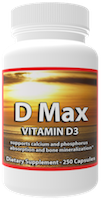
- 1 bottle
- $22.95
- 2 bottles $21.95 each
- $43.90
- 3 bottles $20.95 each
- $62.85
- 6 bottles $18.95 each
- $113.70
- 12 bottles $16.95 each
- $203.40
- 24 bottles $14.95 each
- $358.80
D Max: Supplement Facts
| Serving Size: 1 Capsule
Capsules per container: 250 Servings per container: 250 |
||
| Amount per Serving | % Daily Value | |
|---|---|---|
|
Vitamin D3 (non GMO cholecalciferol) (from sheep lanolin) (100,000 iu/gm) |
5,000 iu | 1,250% |
*Daily value not established.
Other ingredients: Microcrystalline Cellulose, Gelatin, L-Leucine
Directions:
Take 1 capsule 1 time per day (or as directed by your health care provider).
Coral Calcium “Marine Plus”
Coral Calcium: "Marine Plus" is based on the original Coral Calcium Supreme formula that Bob Barefoot used to sell on TV. We've upgraded his 1,000 mg serving size to 1,500 mg. Each 3 capsule serving of "Marine Plus" contains 1,500 mg of "marine grade" coral calcium from Okinawa, Japan, which has the biologically perfect 2 to 1 ratio of calcium to magnesium + 73 naturally occurring trace minerals + Aquamin + Vitamins (A, B, C, D3 & E) + Cesium.
Suggested use:
3 capsules per day
(preferably at regular intervals) with meals.

- 1 bottle - Coral Calcium:
"Marine Plus" - $19.95
- 2 bottles - Coral Calcium:
"Marine Plus" $17.55 each - $35.90
- 3 bottles - Coral Calcium:
"Marine Plus" $16.95 each - $50.85
- 6 bottles - Coral Calcium:
"Marine Plus" $15.95 each - $95.70
- 12 bottles - Coral Calcium:
"Marine Plus" $14.95 each - $179.40
- 24 bottles - Coral Calcium:
"Marine Plus" $13.95 each - $334.80
Coral Calcium “Marine Plus”: Supplement Facts
| Serving Size: 3 Capsules
Capsules per container: 90 Servings per container: 30 |
||
| Amount per Serving | % Daily Value | |
|---|---|---|
|
Coral Calcium (SMP 44®) |
1,500 mg | * |
| Calcium | 375 mg | 37.5% |
| Magnesium | 187.5 mg | 46.5% |
| Strontium | 2.8 mg | * |
|
Marine Algae (AquaminF®) |
362.5 mg | * |
| Calcium | 116 mg | 12.2% |
| Magnesium | 58 mg | 15% |
|
Vitamin D3 (as Cholecalciferol) |
20.4 mcg (816 IU) | 102% |
|
Vitamin A (as Beta Carotene) |
2917 iu | 58% |
|
Vitamin B-1 (as thiamine HCL) |
1.1 mg | 73% |
|
Vitamin B-2 (as Riboflavin Pwd) |
1.2 mg | 71% |
|
Vitamin B-3 (as Niacinamide) |
14 mg | 70% |
|
Vitamin B-5 (as di-Calcium Pantothenate) |
7 mg | 70% |
|
Vitamin B-6 (as Pyndoxine) |
1.4 mg | 70% |
|
Vitamin B-12 (as Cyanocobalamin) |
4.3 mcg | 72% |
|
Vitamin C (as Ascorbic acid) |
70 mg | 117% |
|
Vitamin E (as d-alpha-tocopherol) |
35 iu | 117% |
| Folic Acid | 400 mg | 100% |
|
Zinc (as Amino Acid Chelate) |
16.4 mg | 109% |
|
Selenium (as Amino Acid Chelate) |
30 mcg | 43% |
|
Copper (as Amino Acid Chelate) |
2.4 mg | 120% |
|
Manganese (as Amino Acid Chelate) |
1.44 mg | 72% |
|
Chromium (as Amino Acid Chelate) |
86 mcg | 72% |
|
Boron (as Amino Acid Chelate) |
64 mcg | * |
|
Iodine (from Kelp) |
150 mcg | 100% |
|
Cesium (as chloride) |
3 mg | * |
*Daily value not established.
Other ingredients: Hydroxypropylmethylcellulose, magnesium stearate
Directions:
Take 3 capsules per day (preferably at regular intervals) with meals.
Other Products Available from: NHS Global Distributors LLC
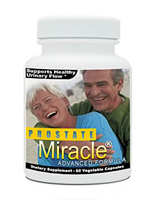
Prostate Miracle®
Trusted by thousands to support healthy urinary flow and prostate health.
read more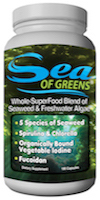
Sea of Greens®
A Whole-Superfood supplement, combining an optimal blend of sea vegetables and Freshwater algae.
read more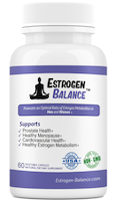
Estrogen Balance®
A natural formula for Men & Women, combining: D.I.M., Quercetin and Flaxseed.
read more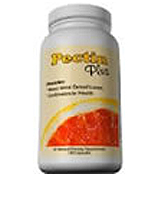
Pectin Plus®
Supports healthy detoxification, healthy blood pressure, healthy cholesterol levels and prostate health
read moreNavigation Links
Contact
255 Rivertown Shops Dr.
Suite 102, PMB 128
Saint Johns, FL 32259
International: 1.805.322.0005
Thank you for visiting v-K2.com
This information here within is designed to provide accurate information in regard to the subject matter covered. It is provided with the understanding that NHS Global Distributors LLC is not engaged in rendering medical advice. If expert assistance is required, the services of a competent medical professional should be sought. These statements have not been evaluated by the Food and Drug Administration. These products are not intended to diagnose, treat, cure or prevent any disease. Always read and follow manufacturer's directions that come with this product.
You are protected by the FDA Dietary Supplement and Nonprescription Drug Consumer Protection Act
please call 877.965.2140 or Click here to report any Adverse Reaction with vK2®.



